- A Deal That Abandons the Unemployed is No Deal at All (Campaign for America's Future)
- The Bipartisan Budget Deal and the Economy: The Beatings Continue (Robert Borosage)
- Tell Congress: Don't Go Home Without Extending Jobless Benefits (Isaiah J. Poole)
- Budget Deal Is More "Awesomely Destructive," Economy-Killing Austerity (Dave Johnson)
A Deal That Abandons the Unemployed is No Deal at All
Campaign for America's Future
Washington has a budget deal. If all goes to plan, it will sail through both chambers, leaving the politicians enough time for a few puffs on a cigar before boarding a flight back to their home districts. We're supposed to applaud, happy they agreed to agree.
But the result is a deal that fails America. It abandons the unemployed, picks the pockets of federal workers and leaves every last corporate loophole and tax dodge in place.
Unemployed workers are abandoned. No renewal of emergency jobless benefits means 1.3 million workers cut off by the end of the year - and with state programs running out, another 3.6 million in 2014.
Billionaires and multinationals are sheltered. Not one cent more in taxes from them to pay for investments vital to our future.
Public workers take another hit, this time through higher payments for their pensions.
And Tea Party-imposed austerity is continued for another two years, ruling out any initiative to rebuild the country and put people to work.
Join us, Call your legislators. Tell them a deal that abandons the unemployed is no deal at all.
This is a misdeal, not a victory. It doesn't reflect our values. It doesn't address our challenges.
Call your member of congress. Tell them a deal that abandons the unemployed is no deal at all.
Thanks for all you do,
The Bipartisan Budget Deal and the Economy: The Beatings Continue
By Robert Borosage
December 12, 2013
Campaign for America's Future
The bipartisan budget agreement released late Tuesday is being celebrated, largely for showing that a deal is possible.
The deal is admittedly small ball, reducing about half of the sequester cuts in 2014 and one-quarter in 2015, a total of $41.7 billion in increased outlays over the two years, according to the Congressional Budget Office, when the government is projected to spend something over $7.4 trillion.
The deal was reached by give and take. Democrats defended Social Security and Medicare from cuts Republicans wanted. Republicans defended billionaires and multinationals from taxes that Democrats wanted. Democrats got some relief from short-term sequester cuts; Republicans got increased long-term deficit reductions. Democrats saved domestic programs from deeper cuts; Republicans saved military programs.
But what is the actual effect on the economy? The deal has been trumpeted as having great beneficial effects, saving hundreds of thousands of jobs that would otherwise be cut, while boosting business confidence that Congress isn't completely dysfunctional and won't continue to "lurch from crisis to crisis," a central talking point of the rollout. Let's take a look at each in turn.
1. The Jobs Effect
Reducing the projected sequester cuts will save jobs that would otherwise have been cut. The Bipartisan Policy Center estimated that the full sequester cuts would cost about 700,000 jobs over the course of 2014, and slow growth by 0.6 percent. Reducing those cuts by half will reduce the carnage. Economist Joel Prakken of Macroeconomic Advisers projects the agreement might increase growth by one-quarter of a percentage point compared to continuing the full sequester cuts.
But half of the mindless across-the-board sequester cuts will continue in fiscal year 2014 and three-fourths in 2015. This will continue harsh effects on government services. If allocations are made proportionately (a big "if" given that Republican appropriators will have disproportionate power in rushed, backroom deals), back-of-the-hand estimates by one expert suggested Head Start will likely have to cut 150,000 children from the program instead of 180,000.
And the budget itself will remain constrictive. 2014 discretionary spending levels are still projected to be lower than they were in 2013 even before adjusting for inflation.
Moreover, the deal excludes the renewal of emergency jobless benefits. This will cut 1.3 million jobless and their families off of assistance by the end of the year. Renewal would put an estimated $26 billion directly into the economy over the course of the year, and generate an estimated 300,000 jobs. The CBO estimates that the net increase in federal outlays in fiscal 2014 from the bipartisan budget deal (sequester relief minus the spending cuts elsewhere) will be $23.3 billion. Not renewing emergency jobless benefits will simply erase the economic benefits of the budget deal.
In sum, the beatings will continue, with a small reduction in strokes. As Larry Mishel, Director of the Economic Policy Institute, concluded, the deal will "do essentially nothing to alter the disastrous trajectory that has characterized fiscal policy since 2011." And even that wiggle room word "essentially" is generous.
2. The Confidence Fairy Returns
The very fact of a deal is celebrated as likely to increase business confidence, end "fiscal uncertainty" caused by manufactured budget crises, and lead to more investment and more jobs.
Paul Krugman has famously scorned these theories as belief in the "confidence fairy." Business invests when it sees market opportunities. It hires when it sees demand for its products rising. In the current economy, businesses are sitting on dough; banks are parking money at the Federal Reserve. They lack customers, not confidence.
Sober business leaders will project a continuation of slow growth, continued mass unemployment and income stagnation, limited growth in export markets, the Federal Reserve beginning to reduce its extraordinary measures, and the Federal budget still in austerity. Military contractors aren't going to hire millions of new employees because the cuts in military procurement will be somewhat less. They may not lay off as many workers, but they aren't likely to add many.
Moreover, as the old Russian proverb taught, one swallow does not make a spring. There is no reason to think that this deal leads to a new era of bipartisan cooperation. Republican leaders wanted a deal because they couldn't afford to shut the government down again politically, and because they wanted to keep railing about Obamacare. Democrats wanted a deal because...well, because they are Democrats.
But the conservative outside groups are mobilizing against the deal. The Tea Party right will vote in large numbers against it. And in about March, the government will run into the debt ceiling again, and a new authorization will be needed to cover the debts that the Congress has already agreed to run up. The era of bipartisan accord might well not last until the spring.
3. Austerity Costs Jobs
The deal provides relief from some of the perverse and destructive sequester cuts. But it sustains Washington's focus on deficit reduction and its commitment to austerity. The two-year agreement contains no initiative that would address the challenges we face. It provides nothing to rebuild our decrepit infrastructure and put people to work, nothing that would fund universal preschool or make college affordable, nothing that would boost research and development to insure the U.S. remains at the cutting edge of innovation, nothing that would even rebuild essential services - from clean water enforcement to FBI capacity - that have suffered over the last years. It keeps the doors open and the lights on, and nothing more.
"Regular order" - doing congressional business without manufactured crises - is a good thing, but it is of limited value if the regular order produces agreements that don't address the challenges we face. And in that regard, this agreement fails completely.
Austerity has been discredited in both theory and practice. The former bastions of fiscal austerity - the International Monetary Fund and the Federal Reserve - have converted in the face of reality, and now plead with governments to increase spending and stimulus to put people back to work.
Somehow Washington has failed to get the message. This deal doesn't end the cutting; it only reduces its severity. It doesn't generate jobs; it only cuts fewer of them. It doesn't help the economy; it only reduces the harm to it.
Surely we can do better than that.
[Robert L. Borosage is a co-director and co-founder of the Campaign for America's Future and the Institute for America's Future. At CAF, He convened the Apollo Alliance coalition that brought unions and environmentalists together to popularize "green jobs" and assembled a Citizens Commission that developed a detailed plan to prove austerity was not needed to reduce the deficit. A graduate of Yale Law School, he left the practice of law to found the Center for National Security Studies in 1974. In 1979, Borosage became director of the Institute for Policy Studies. In 1988, he left the Institute to serve as senior issues advisor to the presidential campaign of the Reverend Jesse Jackson. In 1989, Borosage founded the Campaign for New Priorities, enlisting over 100 national organizations in the call to reinvest in America in the post-Cold War era.]
Tell Congress: Don't Go Home Without Extending Jobless Benefits
By Isaiah J. Poole
December 12, 2013
Campaign for America's Future
Senate Majority Leader Harry Reid today said that continuing extended unemployment benefits to the long-term unemployed will be the first order of business in the Senate when it returns after Congress' Christmas vacation.
Good, but not good enough for the 1.3 million long-term unemployed who are going to lose their benefits by the end of the year unless Congress acts this week. These are some of the more than 4 million people nationwide who have been out of work for six months or more, and are being denied jobs simply because they have been unemployed for so long. They are not, as conservatives blithely claim, people who have been made lazy and soft by a $300-or-so-a-week check. They have been trapped in an endless loop by prospective employers who won't even give these workers a chance to prove themselves.
Nonetheless, too many in Congress do not think that it is a priority to make sure that these 1.3 million people should be able to continue fighting in this hostile job-search environment with the most minimal lifeline - not even enough to pay rent and utilities in most cases.
That is why we have been calling on our supporters to flood their members of Congress today with this simple statement: "A budget deal that abandons the unemployed is no deal at all."
Use our click-to-call tool to get in touch with your congressperson's office.
"There are people who are going to lose their homes over this," said Judy Conti of the National Employment Law Project. That's not hyperbole: After six, nine or sometimes more than a year without a permanent job, most of these 1.3 million people now collecting extended unemployment benefits have exhausted their savings, and sometimes what they can get from relatives and friends as well.
Conti said that starting on December 28, after the last checks go out under this program, we are going to see an uptick in people showing up at homeless shelters and food banks - during what is shaping up to be a particularly harsh winter in much of the country. "It's not pretty," she said.
A recent study, first highlighted by National Journal this week, underscores how particularly cruel, immoral and nonsensical Congress' failure to act on this unemployment extension actually is.
Rand Ghayad, a researcher at the Federal Reserve Bank of Boston and a graduate student in applied economics at Northeastern University, sent thousands of made-up resumes in response to job openings. The resumes often pitted "applicants" with minimal experience but who have not been unemployed for more than a short period of time against those depicted as having more experience but a longer time out of work.
In an interview today, Ghayad said his research led to this stark conclusion: "Once you become unemployed for more than six months, it is almost impossible to get a job interview."
"The only way out," Ghayad said, "is to create more and more jobs."
In fact, Ghayad said, people who are collecting unemployment benefits - and are thus in a system in which they have to verify that they are looking for work - are more likely to remain attached to the labor force than those who have no benefits. Members of the latter group are more likely to become the "discouraged workers" whose numbers have raised the percentage of working-age adults not in the labor force to historic levels.
Remember that these extended unemployment benefits, beyond the benefits the unemployed receive through their state unemployment funds, were enacted by Congress specifically because of the massive loss of jobs that accompanied the financial crash - and we are still years away from repairing the damage done to the job market. In fact, perversely, ending these benefits for the long-term unemployed will actually result in more unemployment - an estimated 300,000 jobs will be lost - because of the spending that will be taken out of the economy when we cut these benefits.
What Congress should be doing is taking immediate steps to accelerate economic growth. The number one priority should be marshaling our resources for such tasks as revitalizing our transportation networks, fixing our schools and investing in clean energy and conservation - steps that would create jobs in the short run, help us sustain long-term economic stability and make it easier for us to address our long-term deficit.
House Republicans are insisting that we should somehow "pay for" these benefits. That is especially ridiculous coming from conservatives who have embraced years of "unpaid-for" tax giveaways to the wealthy and corporations. If anything needs to be paid for, corporations should be finally asked to pay for the legal tax evasion they have engaged in thanks to policies conservatives have put in place.
But we must not wait for that argument to be settled. Congress is about to literally leave 1.3 million Americans out in the cold. Tell your member of Congress that lawmakers should not go home to the comfort of their congressional districts until they make sure that struggling unemployed Americans can keep the lifeline of expended unemployment benefits.
(Update, 5:30 p.m.: The House is about to vote on the budget deal announced between Sen. Patty Murray, D-Wash., and Rep. Paul Ryan, R-Wis., and afterwards is scheduled to adjourn without acting on extended unemployment benefits. You should still call your member of Congress http://vbx.campaignforamericasfuture.org/click2call/ and register your disapproval of their failure to act.)
[Isaiah Poole is Editor of OurFuture.org.]
Budget Deal Is More "Awesomely Destructive," Economy-Killing Austerity
by Dave Johnson
December 12, 2013
Campaign for America's Future
Austerity is holding back our economy - and that's the plan. There is simply no other way to explain it. Republicans know voters blame (or credit) the party of the President for the economy, and they are doing everything they can to make things as bad as can be. This new "budget deal," for example, holds the country in full austerity, with spending lower than even the original "Ryan budget" that shocked everyone.
Austerity kills economies and jobs, and they know it. We know it, they know it, everyone knows it. It is obvious in front of our faces, and Republicans continue to force cuts - with many Democrats going along.
Spending
Since the financial collapse government spending has been cut and the results have been terrible for the economy. Under every previous President government spending and hiring propped up the economy until recovery was underway. Republicans as well as Democrats understood this is how it has to be done. Until now.
In Charts: What if Obama spent like Reagan? Ezra Klein explains, "It's simply a fact that real government spending fell in three of President Obama's first four years." Klein compares government spending to Reagan and `W' Bush:
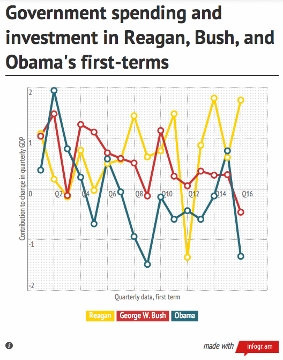
Under Reagan and `W' spending went up. This helped the economy get out of recessions. Under Obama, with a much worse recession, Republicans forced spending to go down.
What was the effect of these cuts? This next chart shows how this is a drag on GDP:
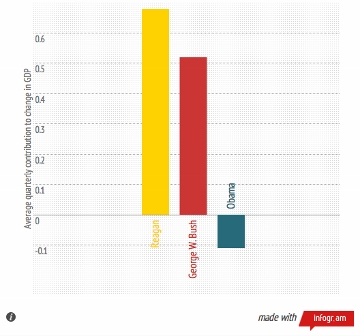
So yes, the spending cuts are obviously hurting the economy.
Paul Krugman's blog post, Unprecedented Austerity comments on this. He starts with a chart showing what has happened to government spending since Obama took office, writing, "Look at total government spending - federal, state, and local - and correct it for inflation ..."
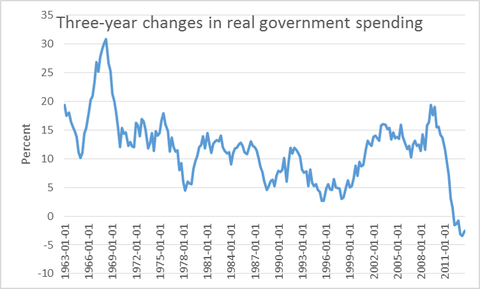
Krugman writes, "You can see that there was a brief, modest spurt in spending associated with the Obama stimulus - but it has long since been outweighed and swamped by a collapse in spending without precedent in the past half century." He calls this, combined with private-sector deleveraging, "awesomely destructive."
"Awesomely destructive." And you can see it.
That "modest spurt in spending associated with the Obama stimulus"? This is the effect the stimulus spending had on jobs:
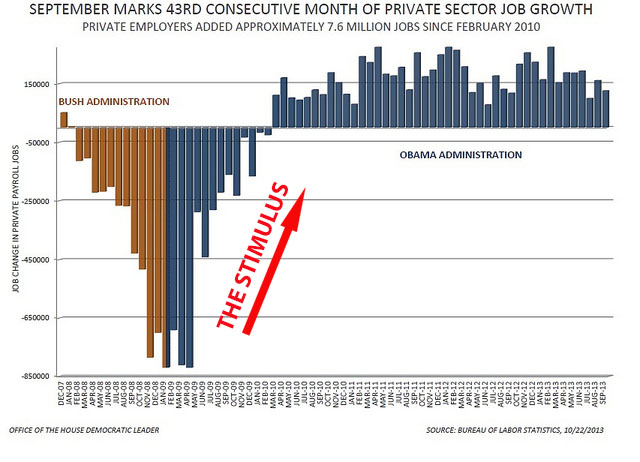
The stimulus took us from losing more than 800,000 jobs each month to gaining jobs every month since. It completely turned the situation around. But then it stopped and Republicans were able to force austerity and kill off the recovery.
This Budget Deal
So that's the story of what has happened to government spending as Republicans impose austerity. Down down down. Now we have a "budget deal" (that even leaves out help for the long-term unemployed and doesn't replace the "Hunger Cliff" $5 billion Thanksgiving Food Stamp cut, etc...) This next chart shows where this budget deal fits with earlier budgets proposals.
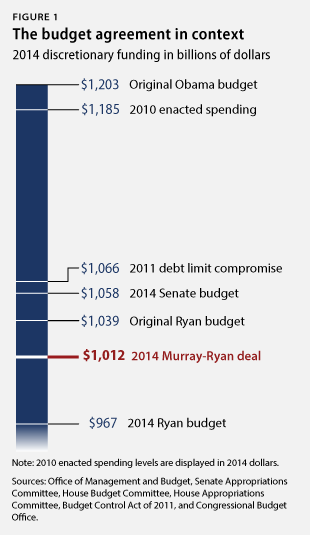
This is what is missing from the explanations of this budget "deal:" spending will still go way down. This is not a spending increase, it is less of a destructive, devastating cut than the full "sequester" would be next year. But it is still a cut, and it will still cost us jobs and economic growth. It will still be "awesomely destructive."
And that is their plan. It will still let them campaign on "Obama's terrible economy."
Jobs
This chart from Calculated Risk shows how government hiring pulled us out of previous recessions, which government firing is holding us in this one.
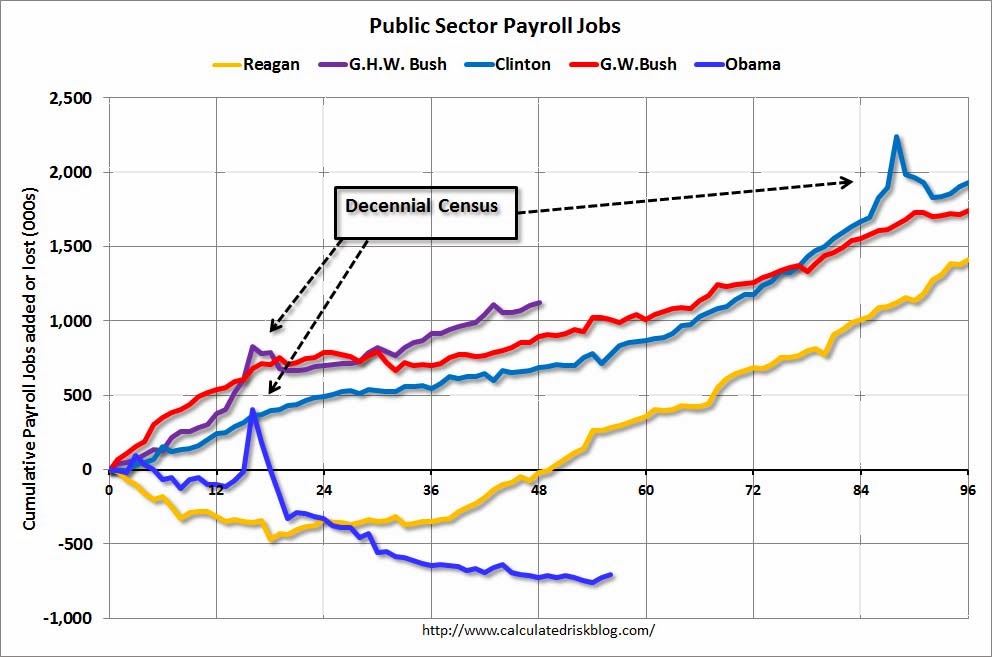
Key point, Presidents Reagan, GHW Bush, Clinton and `W' all increased public hiring to help get us out of recessions. But under Obama and austerity the public sector has lost 703,000 jobs.
The public sector grew during Mr. Reagan's terms (up 1,414,000), during Mr. G.H.W. Bush's term (up 1,127,000), during Mr. Clinton's terms (up 1,934,000), and during Mr. G.W. Bush's terms (up 1,748,000 jobs).
However the public sector has declined significantly since Mr. Obama took office (down 703,000 jobs). These job losses have mostly been at the state and local level, but more recently at the Federal level. This has been a significant drag on overall employment.
The 2014 Election
So let's take bets: do you disagree that Republicans are planning to campaign in 2014 by saying that the terrible economy is Obama's fault?
PS: Some of these charts are from Three Charts That Show That Republicans Have Won The Budget War by Danny Vinik, who writes that "the fact of the matter is that the GOP has won the budget wars." Let's see if they take credit for the economy and terrible human pain they are causing.
[Dave Johnson has more than 20 years of technology industry experience. His earlier career included technical positions, including video game design at Atari and Imagic.]

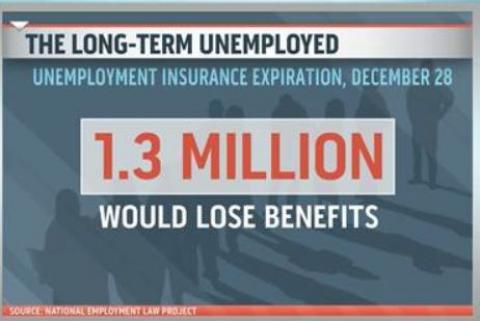

Spread the word